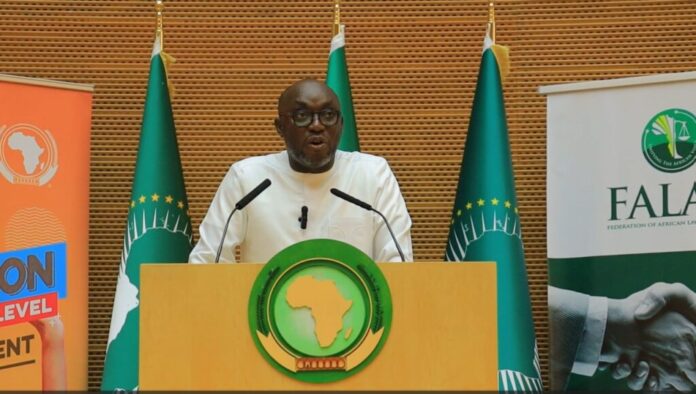Member of Parliament for Abuakwa South, Dr. Kingsley Agyemang, has called on African lawmakers to take bold legislative steps to close the continent’s healthcare gap and make access to quality health services a guaranteed right for all citizens.
He was delivering the keynote address at the 5th Annual Federation of African Law Students (FALAS) Continental Conference at the African Union Headquarters in Addis Ababa, Ethiopia.
Dr. Agyemang urged governments and parliaments to move beyond policy statements and pass binding laws that ensure Universal Health Coverage (UHC) and uphold human dignity.
The event brought together legal scholars, law students, policymakers, and AU officials under the theme “Legislating for Health Justice: Advancing Universal Health Coverage in the Pan-African Context.”
Reflecting on his flight from Accra to Addis Ababa, Dr. Agyemang said the view from above reminded him of Africa’s shared identity despite its unequal realities.
“As our Ethiopian Airlines flight soared from Accra, we crossed the skies above Togo, Benin, Nigeria, the Central African Republic, and South Sudan before descending over the highlands of Ethiopia. Looking down, I saw one Africa — the same rivers, forests, and farmlands, the same vibrant communities and faces. We are one people, yet our realities are profoundly different,” he said.
He likened Africa’s journey toward health justice to a continental flight, with countries traveling at different speeds due to history, governance, and resource disparities.
Dr. Agyemang emphasized that achieving health justice requires strong legal frameworks, constitutional backing, and effective parliamentary oversight.
“Health justice is the heartbeat of development. It calls for a legal order where access to quality healthcare is not a privilege for the few but a right guaranteed to every citizen,” he said. “To legislate for health justice is to legislate for human dignity.”
Drawing from Ghana’s experience, he cited the **National Health Insurance Scheme (NHIS)** as a landmark effort but urged continuous reforms guided by data and stakeholder input.
“Ghana’s National Health Insurance Act was a pioneering step toward equity in access. But legislative action is not a single event. It must be a living process — informed by evidence, revised financing, and stakeholder participation.”
He further stressed the importance of parliamentary oversight, describing it as “the conscience of democracy” that ensures accountability and protects the interests of citizens.
To humanize the issue, Dr. Agyemang recalled a story from his constituency:
“A few years ago, I met a young mother who had walked more than six kilometres to reach a health centre, only to find that the nurse on duty had no delivery kit. She wrapped her newborn in her own scarf and whispered that she was grateful her child had survived. That encounter taught me that legislation must not only allocate funds; it must protect dignity.”
He also highlighted stories from across the continent — from health workers in Malawi wading through floods to deliver vaccines to mobile clinics in Kenya powered by solar energy.
“These are not acts of charity; they are acts of justice in motion. They remind us that the pursuit of Universal Health Coverage is ultimately a pursuit of equity and empathy.”
Calling for deeper continental collaboration, Dr. Agyemang urged African Union member states to strengthen regional health systems, citing the African Medicines Agency and the Africa Centres for Disease Control and Prevention (Africa CDC) as examples of progress.
“Disease, like poverty, knows no borders. A child’s cough in Lagos, a cholera outbreak in Harare, or a malaria surge in Kisangani can ripple through the continent if we do not stand together. If we can integrate our skies through the African Continental Free Trade Area, surely we can integrate our health systems.”
He praised Ethiopia for its leadership in health diplomacy and called on young African lawyers to become advocates for equity and human rights.
“Every argument you present in court, every brief you write, and every policy recommendation you make can bring health closer to the people who need it most. Health justice must not be an abstract principle debated in parliaments; it must be a lived experience that touches every African home.”
Dr. Agyemang ended his address with a rallying call for unity and action.
“The future of health justice in Africa will not be written by chance. It will be written by those who stand for equity, compassion, and action. Let us legislate, innovate, and collaborate to create a continent where every citizen enjoys the right to health, the freedom to thrive, and the promise of justice.”
Participants described his message as one of the most thought-provoking contributions to the ongoing debate on health law and governance, calling it a “wake-up call” for African legislators to move from policy rhetoric to practical reforms.
Source: Adomonline
ALSO READ:



